Understanding Sleepwalking: Symptoms, Causes, and Treatment
VerifiedAdded on 2023/04/25
|13
|827
|73
Report
AI Summary
This report provides a comprehensive overview of sleepwalking, also known as somnambulism, a sleep disorder characterized by walking or performing activities while asleep. The report details the disorder's prevalence, primarily in children, and distinguishes it from other sleep disorders. It explores the symptoms, including open eyes, blank expressions, and potential for complex behaviors, and the causes, such as genetic inheritance, sleep deprivation, stress, and substance use. Legal implications, such as criminal cases involving sleepwalking, are discussed, along with psychological effects like depression. The report also covers treatment and prevention strategies, including medical interventions and lifestyle adjustments, and references relevant research to support its findings.
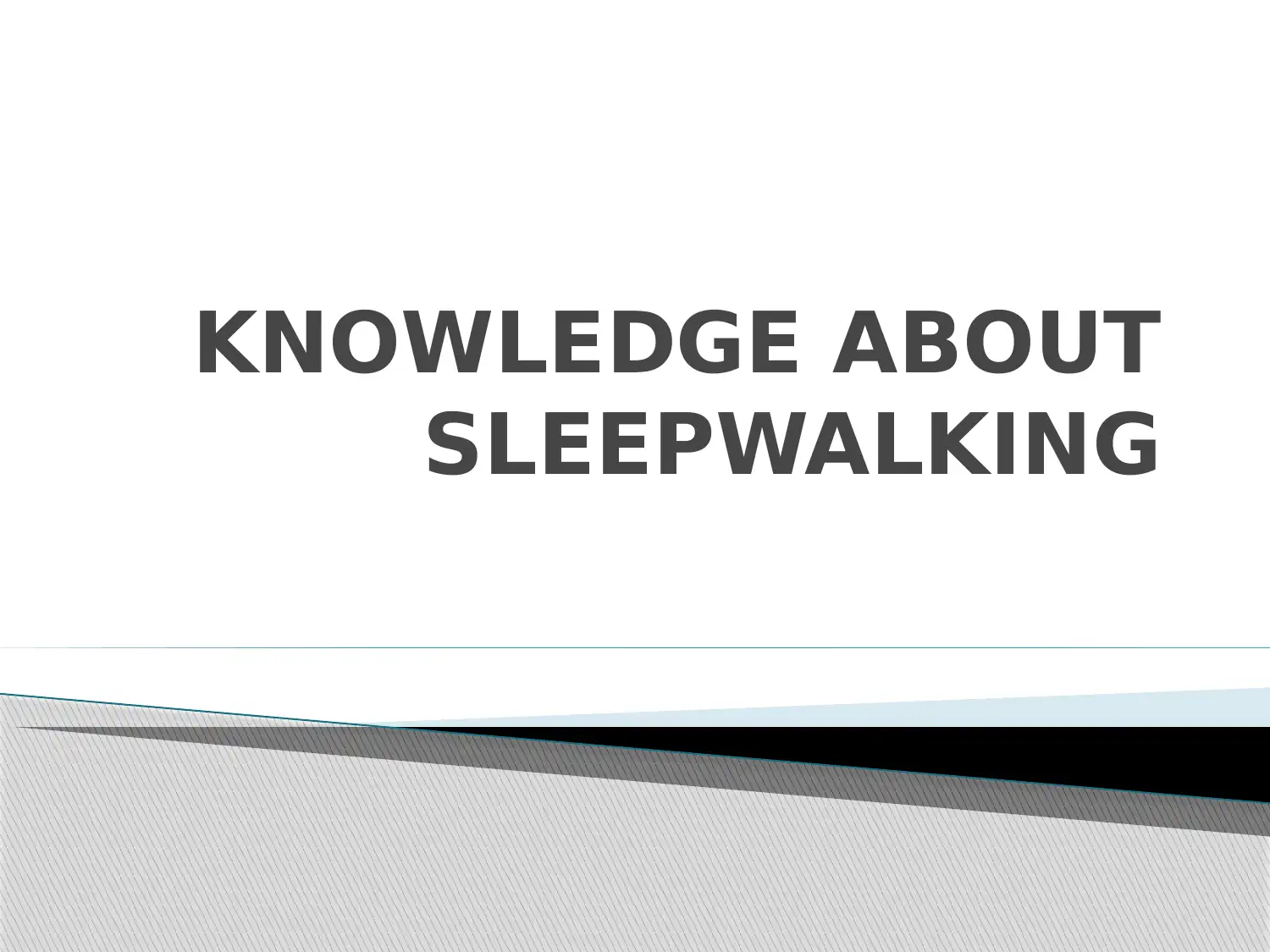
KNOWLEDGE ABOUT
SLEEPWALKING
SLEEPWALKING
Paraphrase This Document
Need a fresh take? Get an instant paraphrase of this document with our AI Paraphraser
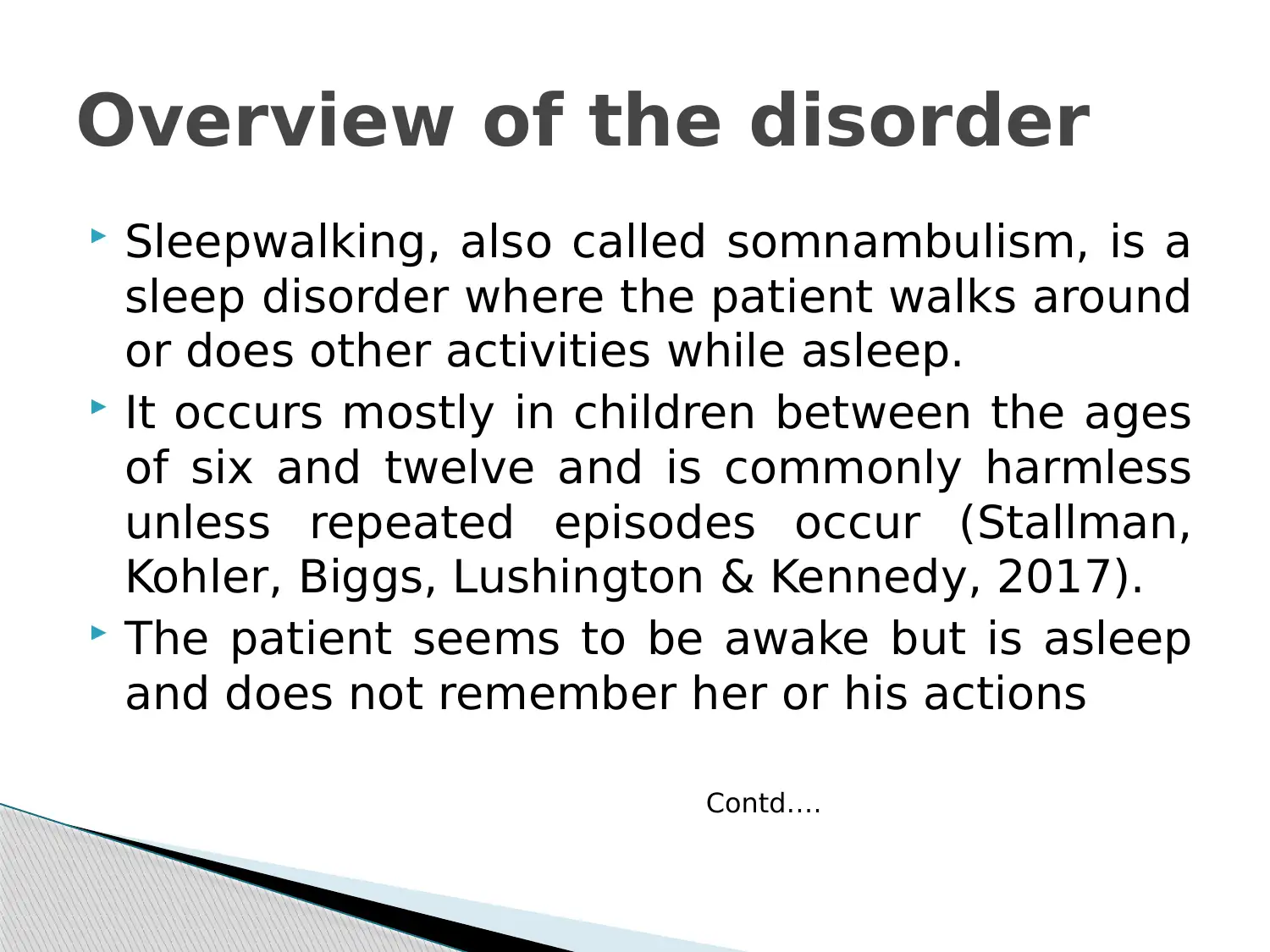
Sleepwalking, also called somnambulism, is a
sleep disorder where the patient walks around
or does other activities while asleep.
It occurs mostly in children between the ages
of six and twelve and is commonly harmless
unless repeated episodes occur (Stallman,
Kohler, Biggs, Lushington & Kennedy, 2017).
The patient seems to be awake but is asleep
and does not remember her or his actions
Contd….
Overview of the disorder
sleep disorder where the patient walks around
or does other activities while asleep.
It occurs mostly in children between the ages
of six and twelve and is commonly harmless
unless repeated episodes occur (Stallman,
Kohler, Biggs, Lushington & Kennedy, 2017).
The patient seems to be awake but is asleep
and does not remember her or his actions
Contd….
Overview of the disorder
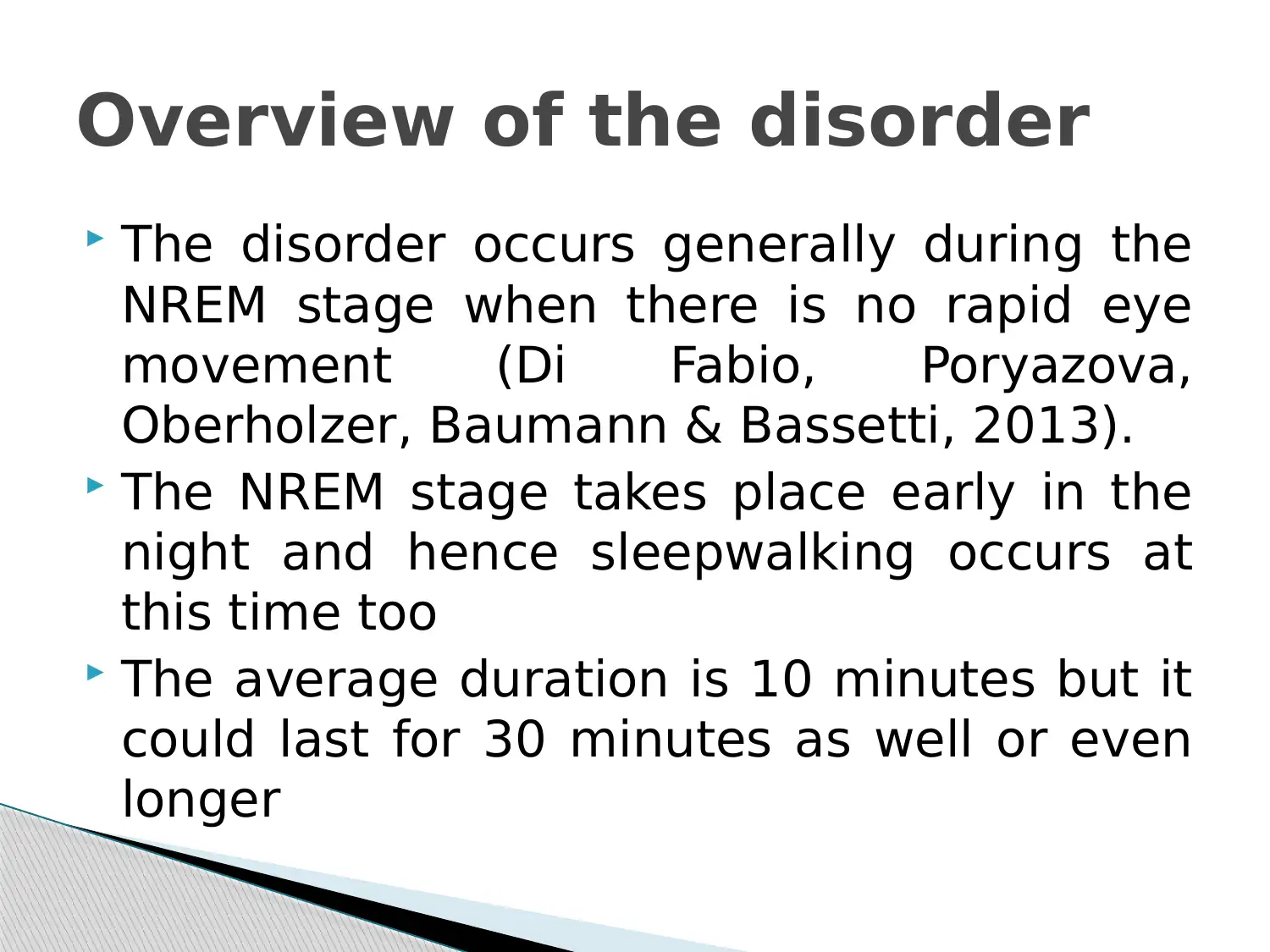
The disorder occurs generally during the
NREM stage when there is no rapid eye
movement (Di Fabio, Poryazova,
Oberholzer, Baumann & Bassetti, 2013).
The NREM stage takes place early in the
night and hence sleepwalking occurs at
this time too
The average duration is 10 minutes but it
could last for 30 minutes as well or even
longer
Overview of the disorder
NREM stage when there is no rapid eye
movement (Di Fabio, Poryazova,
Oberholzer, Baumann & Bassetti, 2013).
The NREM stage takes place early in the
night and hence sleepwalking occurs at
this time too
The average duration is 10 minutes but it
could last for 30 minutes as well or even
longer
Overview of the disorder
⊘ This is a preview!⊘
Do you want full access?
Subscribe today to unlock all pages.

Trusted by 1+ million students worldwide
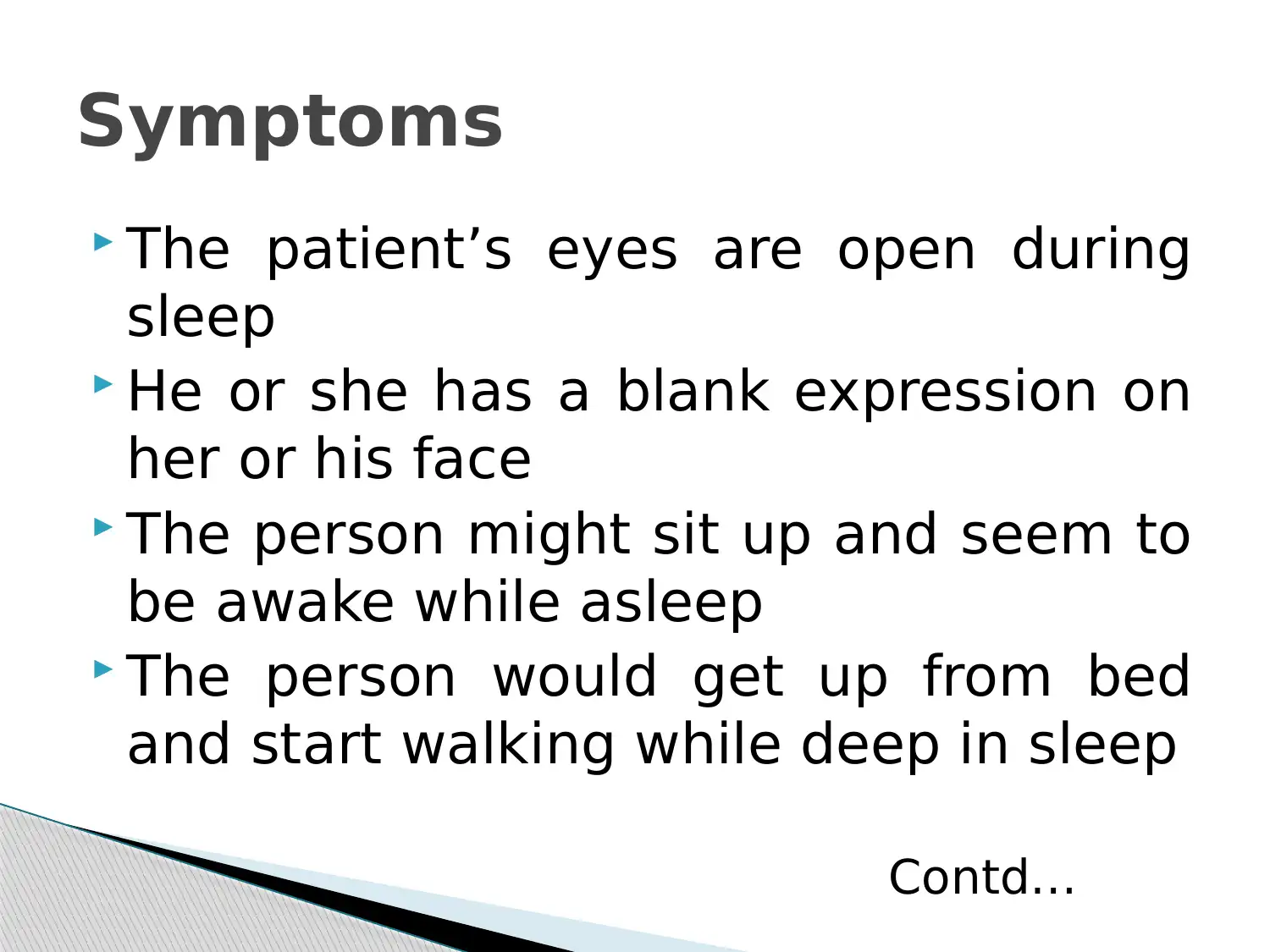
The patient’s eyes are open during
sleep
He or she has a blank expression on
her or his face
The person might sit up and seem to
be awake while asleep
The person would get up from bed
and start walking while deep in sleep
Contd…
Symptoms
sleep
He or she has a blank expression on
her or his face
The person might sit up and seem to
be awake while asleep
The person would get up from bed
and start walking while deep in sleep
Contd…
Symptoms
Paraphrase This Document
Need a fresh take? Get an instant paraphrase of this document with our AI Paraphraser
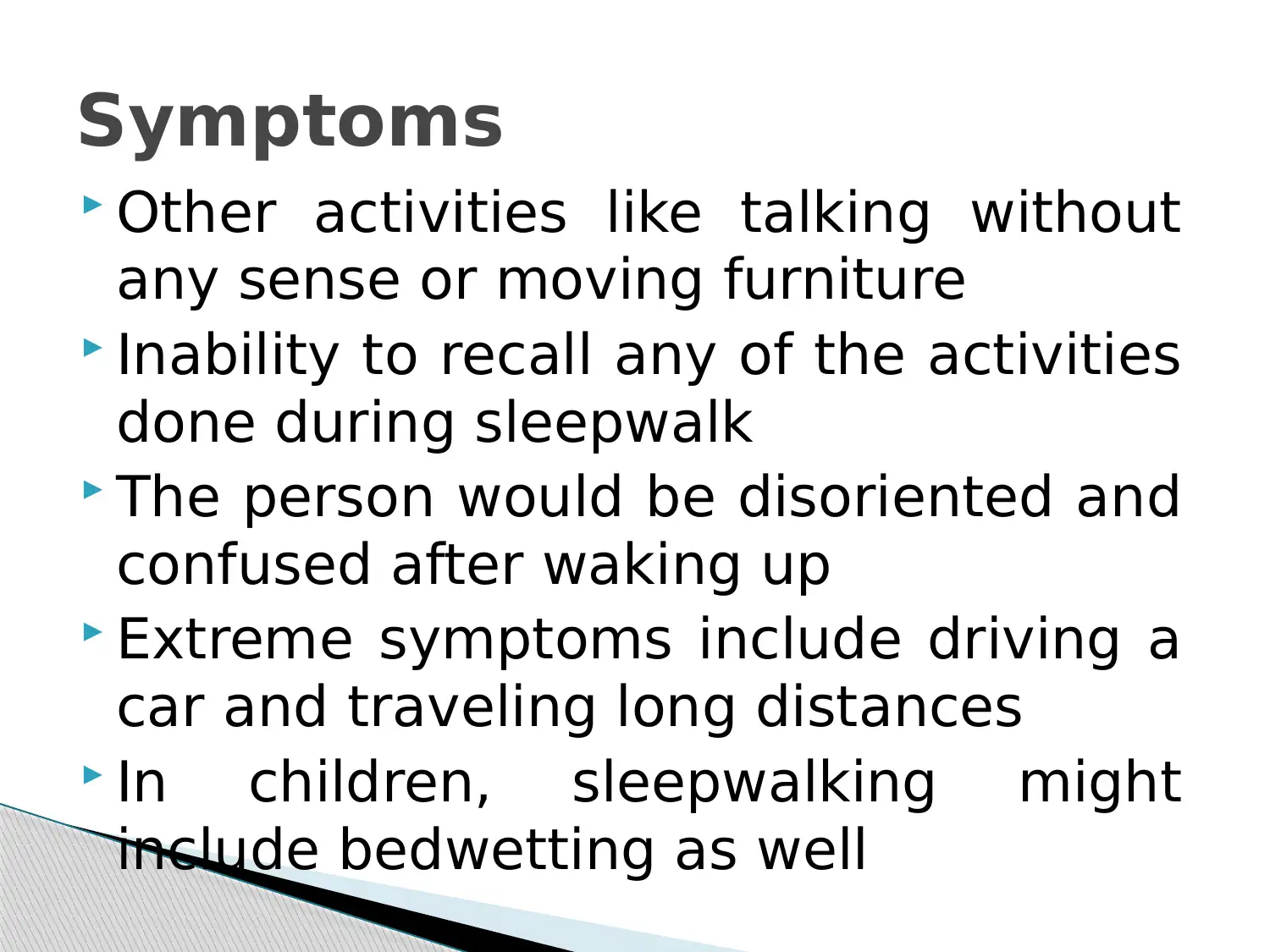
Other activities like talking without
any sense or moving furniture
Inability to recall any of the activities
done during sleepwalk
The person would be disoriented and
confused after waking up
Extreme symptoms include driving a
car and traveling long distances
In children, sleepwalking might
include bedwetting as well
Symptoms
any sense or moving furniture
Inability to recall any of the activities
done during sleepwalk
The person would be disoriented and
confused after waking up
Extreme symptoms include driving a
car and traveling long distances
In children, sleepwalking might
include bedwetting as well
Symptoms
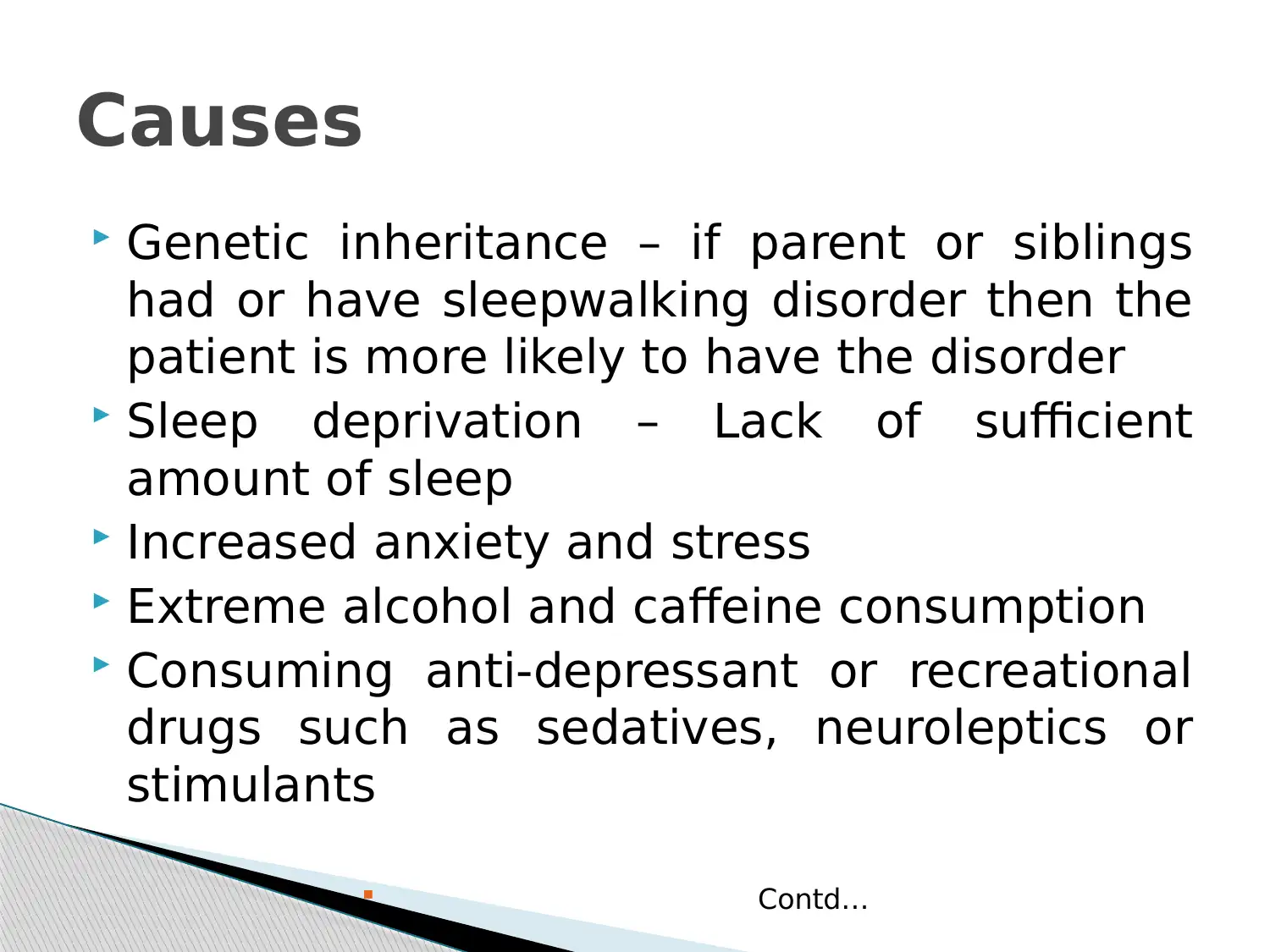
Genetic inheritance – if parent or siblings
had or have sleepwalking disorder then the
patient is more likely to have the disorder
Sleep deprivation – Lack of sufficient
amount of sleep
Increased anxiety and stress
Extreme alcohol and caffeine consumption
Consuming anti-depressant or recreational
drugs such as sedatives, neuroleptics or
stimulants
Contd…
Causes
had or have sleepwalking disorder then the
patient is more likely to have the disorder
Sleep deprivation – Lack of sufficient
amount of sleep
Increased anxiety and stress
Extreme alcohol and caffeine consumption
Consuming anti-depressant or recreational
drugs such as sedatives, neuroleptics or
stimulants
Contd…
Causes
⊘ This is a preview!⊘
Do you want full access?
Subscribe today to unlock all pages.

Trusted by 1+ million students worldwide
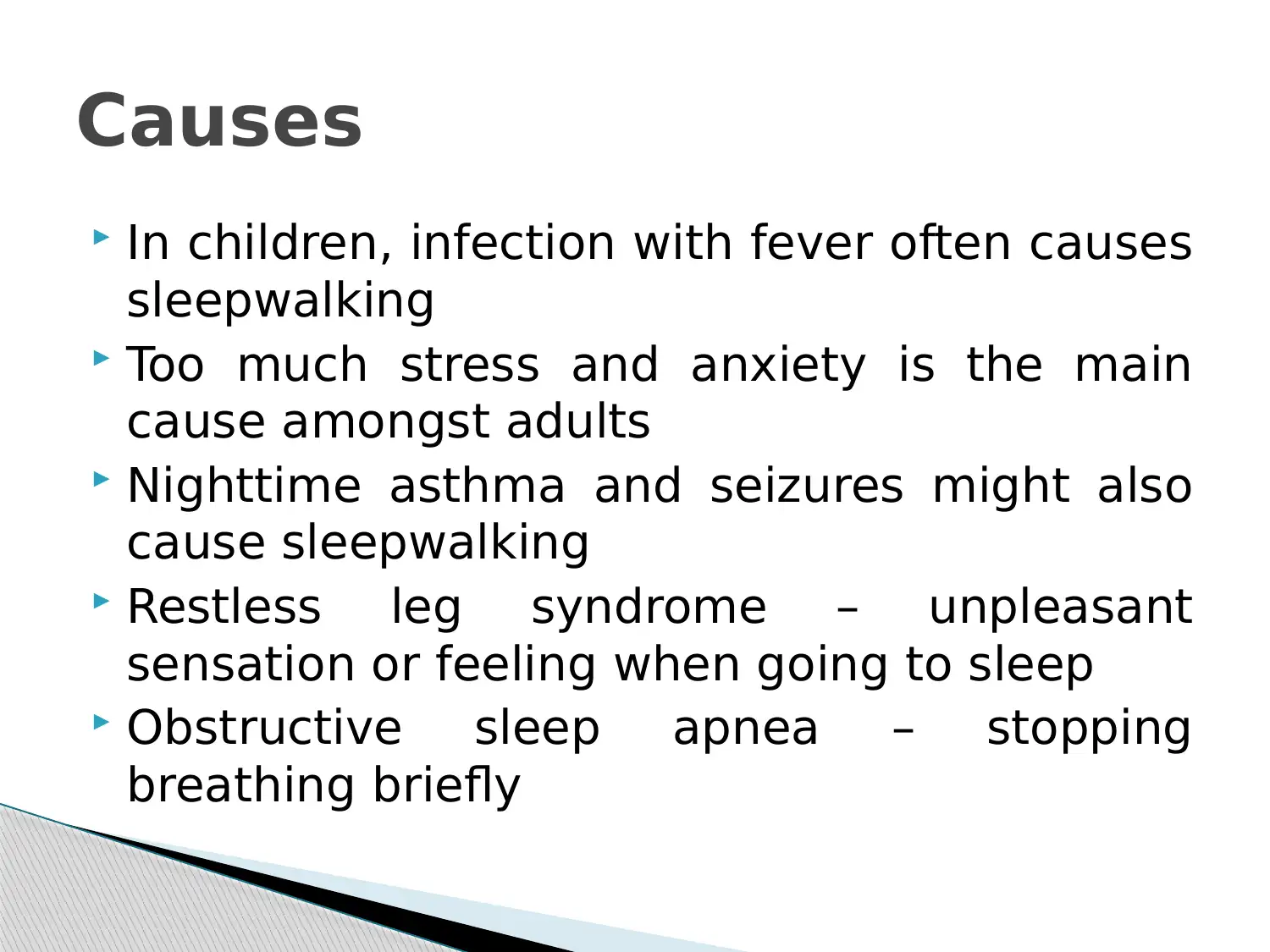
In children, infection with fever often causes
sleepwalking
Too much stress and anxiety is the main
cause amongst adults
Nighttime asthma and seizures might also
cause sleepwalking
Restless leg syndrome – unpleasant
sensation or feeling when going to sleep
Obstructive sleep apnea – stopping
breathing briefly
Causes
sleepwalking
Too much stress and anxiety is the main
cause amongst adults
Nighttime asthma and seizures might also
cause sleepwalking
Restless leg syndrome – unpleasant
sensation or feeling when going to sleep
Obstructive sleep apnea – stopping
breathing briefly
Causes
Paraphrase This Document
Need a fresh take? Get an instant paraphrase of this document with our AI Paraphraser
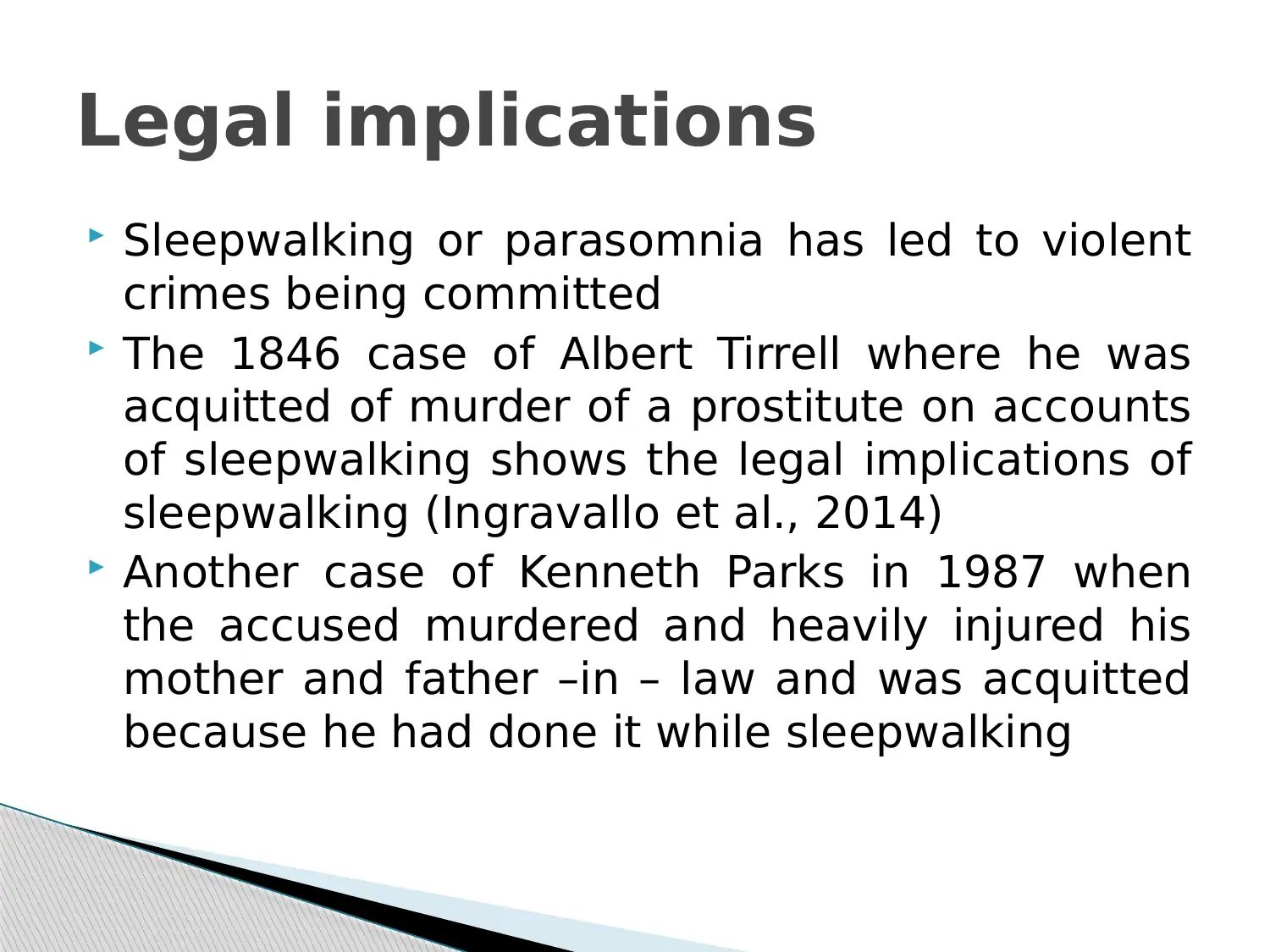
Sleepwalking or parasomnia has led to violent
crimes being committed
The 1846 case of Albert Tirrell where he was
acquitted of murder of a prostitute on accounts
of sleepwalking shows the legal implications of
sleepwalking (Ingravallo et al., 2014)
Another case of Kenneth Parks in 1987 when
the accused murdered and heavily injured his
mother and father –in – law and was acquitted
because he had done it while sleepwalking
Legal implications
crimes being committed
The 1846 case of Albert Tirrell where he was
acquitted of murder of a prostitute on accounts
of sleepwalking shows the legal implications of
sleepwalking (Ingravallo et al., 2014)
Another case of Kenneth Parks in 1987 when
the accused murdered and heavily injured his
mother and father –in – law and was acquitted
because he had done it while sleepwalking
Legal implications
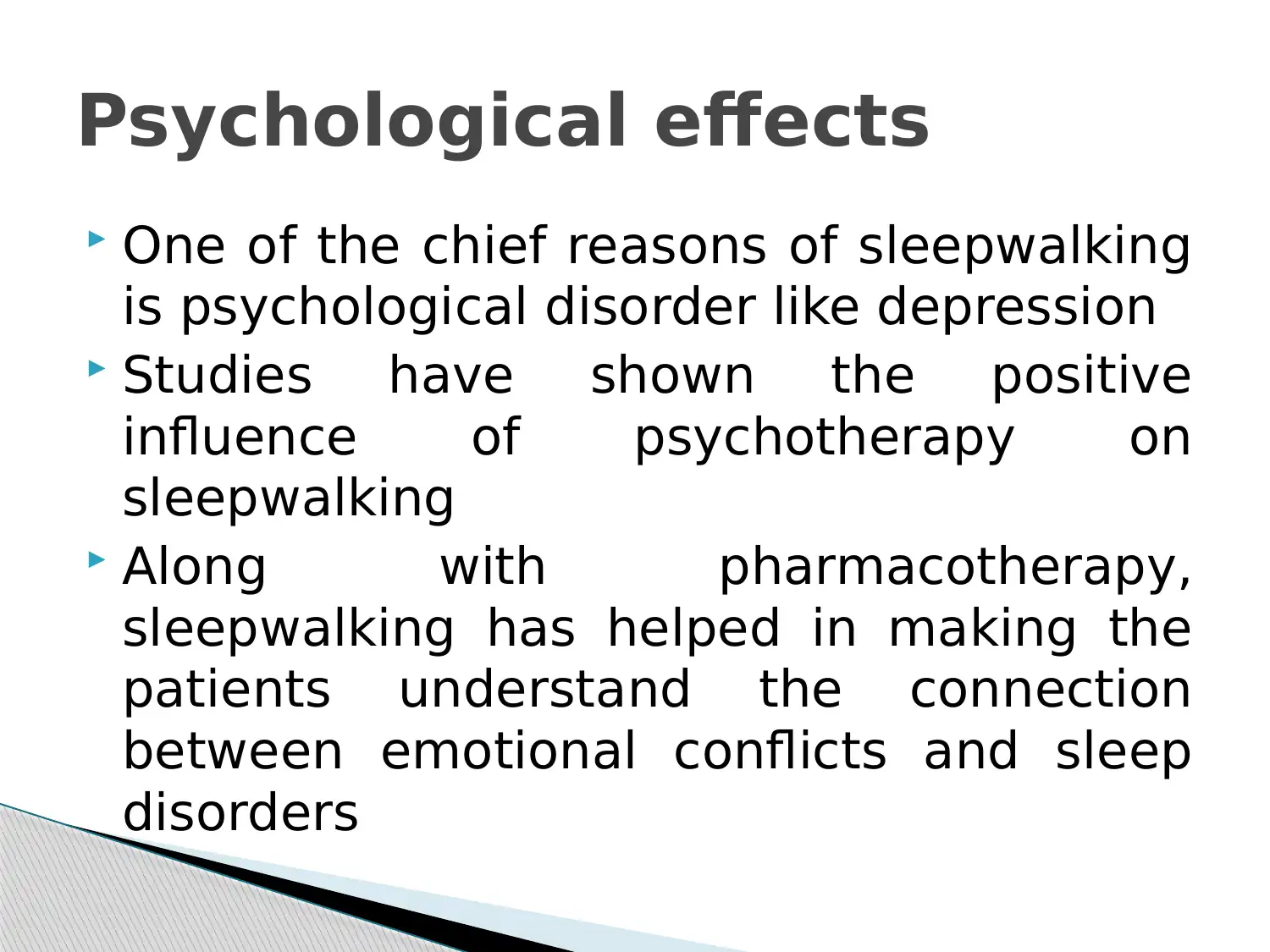
One of the chief reasons of sleepwalking
is psychological disorder like depression
Studies have shown the positive
influence of psychotherapy on
sleepwalking
Along with pharmacotherapy,
sleepwalking has helped in making the
patients understand the connection
between emotional conflicts and sleep
disorders
Psychological effects
is psychological disorder like depression
Studies have shown the positive
influence of psychotherapy on
sleepwalking
Along with pharmacotherapy,
sleepwalking has helped in making the
patients understand the connection
between emotional conflicts and sleep
disorders
Psychological effects
⊘ This is a preview!⊘
Do you want full access?
Subscribe today to unlock all pages.

Trusted by 1+ million students worldwide
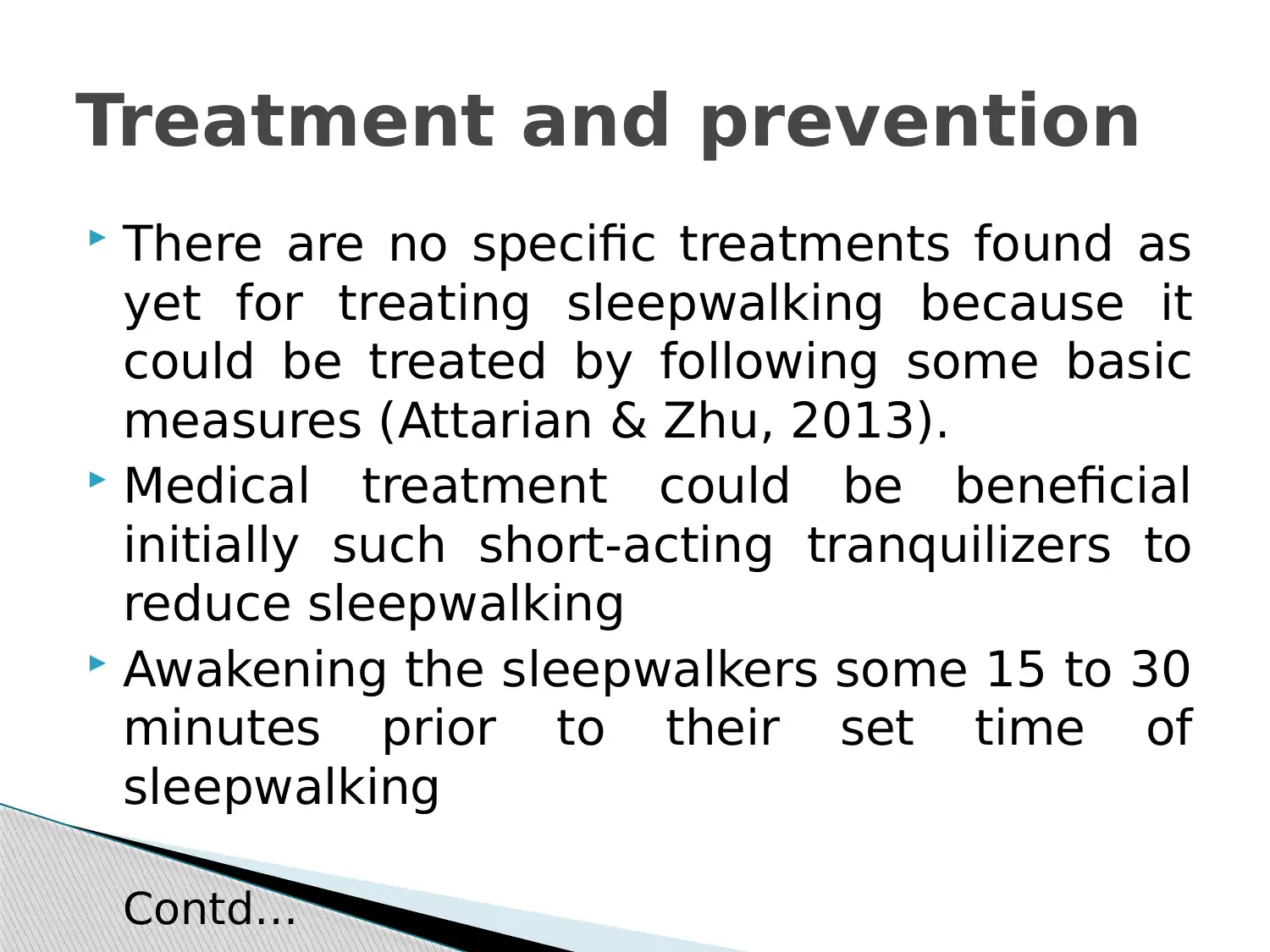
There are no specific treatments found as
yet for treating sleepwalking because it
could be treated by following some basic
measures (Attarian & Zhu, 2013).
Medical treatment could be beneficial
initially such short-acting tranquilizers to
reduce sleepwalking
Awakening the sleepwalkers some 15 to 30
minutes prior to their set time of
sleepwalking
Contd…
Treatment and prevention
yet for treating sleepwalking because it
could be treated by following some basic
measures (Attarian & Zhu, 2013).
Medical treatment could be beneficial
initially such short-acting tranquilizers to
reduce sleepwalking
Awakening the sleepwalkers some 15 to 30
minutes prior to their set time of
sleepwalking
Contd…
Treatment and prevention
Paraphrase This Document
Need a fresh take? Get an instant paraphrase of this document with our AI Paraphraser
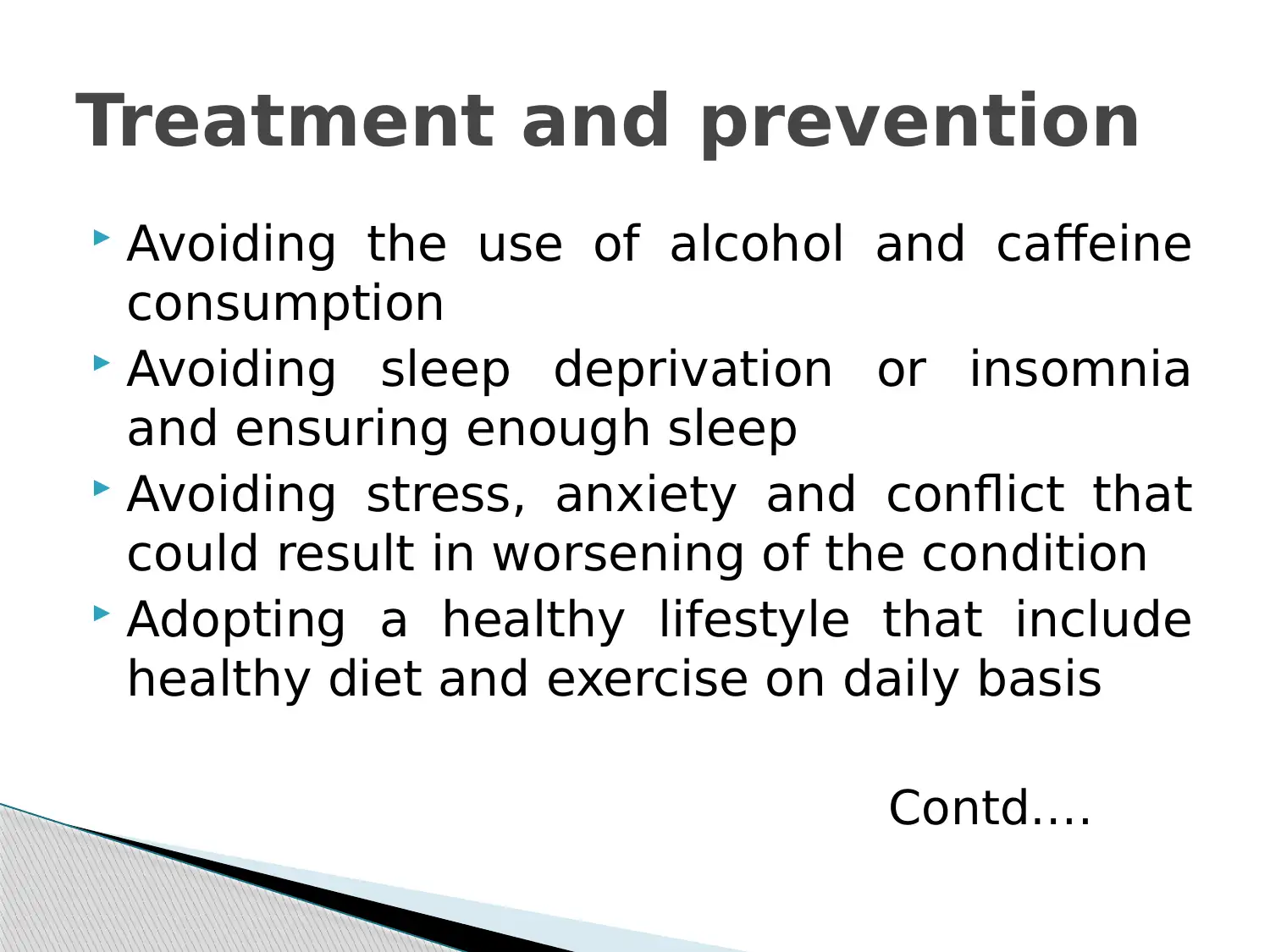
Avoiding the use of alcohol and caffeine
consumption
Avoiding sleep deprivation or insomnia
and ensuring enough sleep
Avoiding stress, anxiety and conflict that
could result in worsening of the condition
Adopting a healthy lifestyle that include
healthy diet and exercise on daily basis
Contd….
Treatment and prevention
consumption
Avoiding sleep deprivation or insomnia
and ensuring enough sleep
Avoiding stress, anxiety and conflict that
could result in worsening of the condition
Adopting a healthy lifestyle that include
healthy diet and exercise on daily basis
Contd….
Treatment and prevention
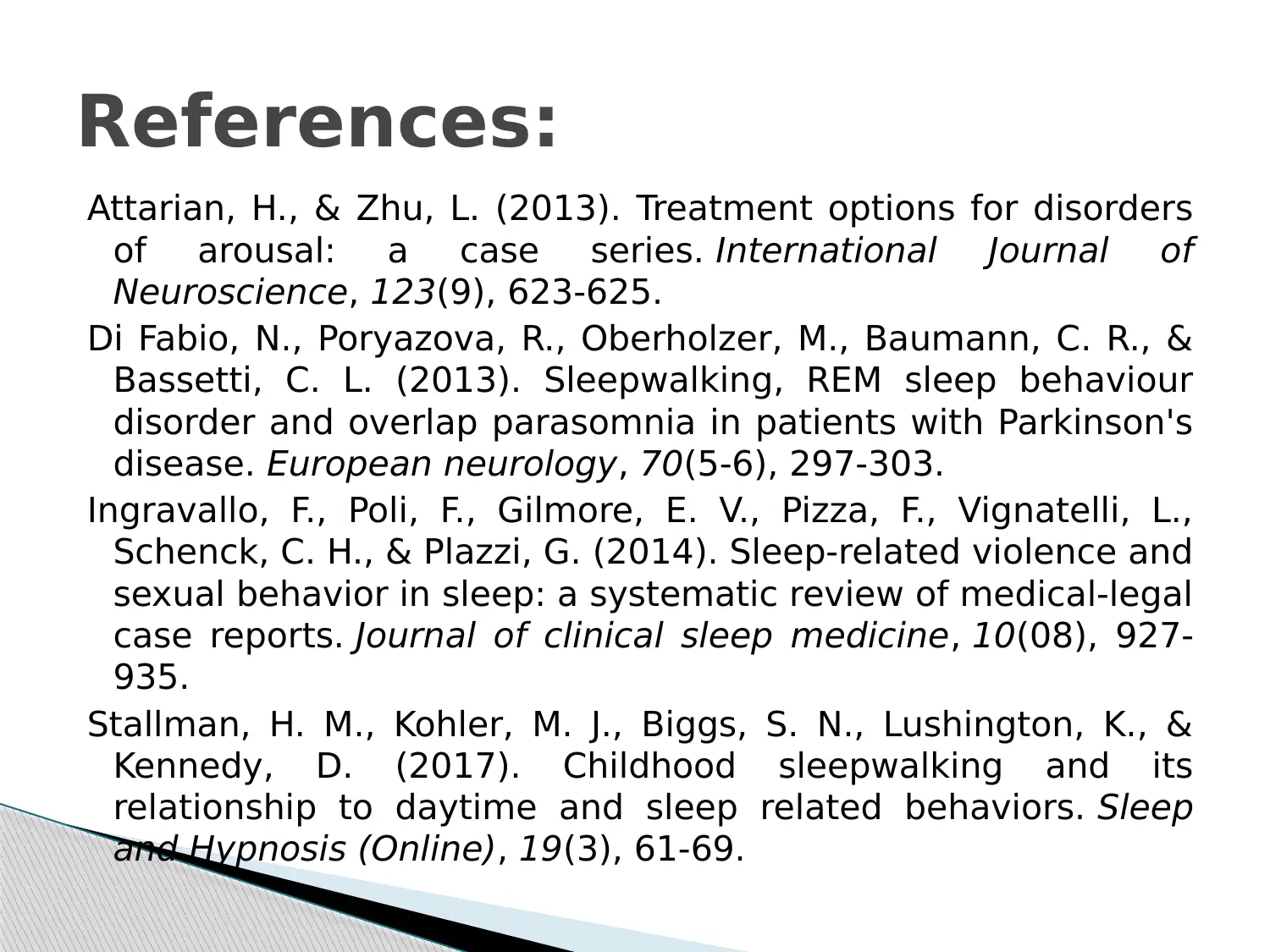
Attarian, H., & Zhu, L. (2013). Treatment options for disorders
of arousal: a case series. International Journal of
Neuroscience, 123(9), 623-625.
Di Fabio, N., Poryazova, R., Oberholzer, M., Baumann, C. R., &
Bassetti, C. L. (2013). Sleepwalking, REM sleep behaviour
disorder and overlap parasomnia in patients with Parkinson's
disease. European neurology, 70(5-6), 297-303.
Ingravallo, F., Poli, F., Gilmore, E. V., Pizza, F., Vignatelli, L.,
Schenck, C. H., & Plazzi, G. (2014). Sleep-related violence and
sexual behavior in sleep: a systematic review of medical-legal
case reports. Journal of clinical sleep medicine, 10(08), 927-
935.
Stallman, H. M., Kohler, M. J., Biggs, S. N., Lushington, K., &
Kennedy, D. (2017). Childhood sleepwalking and its
relationship to daytime and sleep related behaviors. Sleep
and Hypnosis (Online), 19(3), 61-69.
References:
of arousal: a case series. International Journal of
Neuroscience, 123(9), 623-625.
Di Fabio, N., Poryazova, R., Oberholzer, M., Baumann, C. R., &
Bassetti, C. L. (2013). Sleepwalking, REM sleep behaviour
disorder and overlap parasomnia in patients with Parkinson's
disease. European neurology, 70(5-6), 297-303.
Ingravallo, F., Poli, F., Gilmore, E. V., Pizza, F., Vignatelli, L.,
Schenck, C. H., & Plazzi, G. (2014). Sleep-related violence and
sexual behavior in sleep: a systematic review of medical-legal
case reports. Journal of clinical sleep medicine, 10(08), 927-
935.
Stallman, H. M., Kohler, M. J., Biggs, S. N., Lushington, K., &
Kennedy, D. (2017). Childhood sleepwalking and its
relationship to daytime and sleep related behaviors. Sleep
and Hypnosis (Online), 19(3), 61-69.
References:
⊘ This is a preview!⊘
Do you want full access?
Subscribe today to unlock all pages.

Trusted by 1+ million students worldwide
1 out of 13
Related Documents
Your All-in-One AI-Powered Toolkit for Academic Success.
+13062052269
info@desklib.com
Available 24*7 on WhatsApp / Email
![[object Object]](/_next/static/media/star-bottom.7253800d.svg)
Unlock your academic potential
Copyright © 2020–2026 A2Z Services. All Rights Reserved. Developed and managed by ZUCOL.





